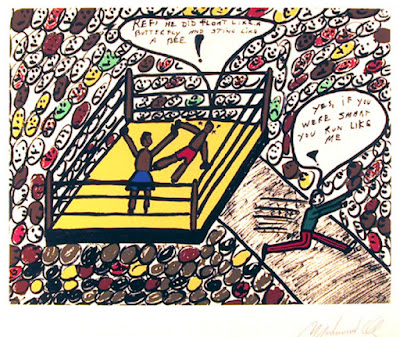I am
heartbroken. I am preparing to leave for Costa Rica this afternoon but had to
write this before I got out of here. I owe my champion that much.
Muhammad
Ali gone. I’m trying to wrap my head around this loss. This loss of not just a
sports icon, although surely he was that; not just the loss of one fine brutha,
because he was undeniably that too; not just the loss of a political lightening
rod because lawd knows he fit that bill; but the loss of an era because he
represented the best of a time that was so affirming for so many of us African
people.
Muhammad
Ali burst on the scene as a young, brash, self assured sho nuff brother at a
time when Black people all over the world so needed a voice that spoke loudly
and confidently. His metamorphosis from Negro to Black represented that of an
entire Black World and in so many ways helped us all stand a little more firmly
on a Black ideological platform. As a striving artist trying to define a Black
aesthetic in my work, I know I felt a certain kinda way looking at this fine
black brother stand up to the white power structure and refuse to fight their
war. I know I puffed up just a little more when he refused to be subservient to
the white journalistic world and spit back at them retorts that made their
heads spin, never letting them put him in some “dumb boxer” box. I can still
recall how proud I felt that this King of the athletic world wasn’t afraid to
have strong political views that didn’t include kowtowing to white folks and
extolled loving your blackness because all of us needed to be reminded of this
daily in order to stay strong in racist America.
Muhammad
Ali was a complex man; a man who many didn’t realize was a latent artist. Like
his father, he loved making art, and like his father, was never directed/allowed
to follow that path. I wonder what would have happened had he been encouraged
to follow his talent in art rather than boxing. According to his biographers,
art and physical education were the only two subjects he did well in as a
student in school (I suspect he had dyslexia, a learning difference that didn’t
get much attention until long after Ali had graduated). When I saw some of
Ali’s work a while back it was evident that he had a keen eye for design and
color and his comical piece depicting the epic Ali-Liston fight had a nice
political bite, I couldn’t help but to wonder if Ali wouldn’t have been at the
forefront of the Black Arts Movement were his art aspirations realized. I saw
an interview with artist Layla Ali (no relation to Muhammad Ali but ironically
having the same name as his daughter albeit spelled differently) where she
explained her need to make art. She said, and I’m paraphrasing, that
essentially she had to make sense out of the electrical/spiritual energy that
was rolling around in her head vis-à-vis artmaking or someone would get
hurt! What would have happened if
Muhammad Ali had made that journey into his creative energy persona rather than
his athletic energy persona? I wonder if his world of hurting someone
physically would have been one of hurting someone psychically?
I know this is a conversation that is veering way off the course of talking
about Muhammad Ali’s life as a Black Icon, but is it really? When I think of the power of art to shape
society, I think of why so many African people are never encouraged to follow
that path. I think of how young Black boys throughout urban America (who are
just like young Cassius Clay) can demonstrate ability in the arts but not have
that cultivated in favor of pumping them up as athletes. I think how they can
be used as athletic pawns in the game of professional sports only to be
discarded once past their prime, and left with nothing to renew their humanness
so they self-destruct. Muhammad Ali was
one of the lucky ones in so much as he at least wasn’t left broke at the end of
his usefulness to the sports world. But he was left physically broke and in
some ways was defanged because his ability to articulate verbally was no longer
possible and his disease rendered him incapable of pursuing his creative side.
What would Muhammad Ali the painter be telling us if he were articulating the
political views of the Ali I so love? How potent would his visual messages be
to us about what it means to be Black in a time when #blacklivesmatter is the
hashtag of the era? Granted, he may
never have reached the worldwide stage as an artist and therefore not gained the
platform to influence in the way that he did as an athlete, but I can’t help
thinking that someone with his charisma and self-assuredness would have made
his mark in a big way, no matter what the limitations inflicted by the
so-called mainstream artworld.
Vicki Meek is a retired arts manager, a
practicing artist and activist splitting her time between Dallas & Costa
Rica. She writes a blog Art & Racenotes and a column ART-iculate for
TheaterJones.com, both exploring issues around race, politics and the arts. Contact
her at www.art-racenotes.blogspot.com.









